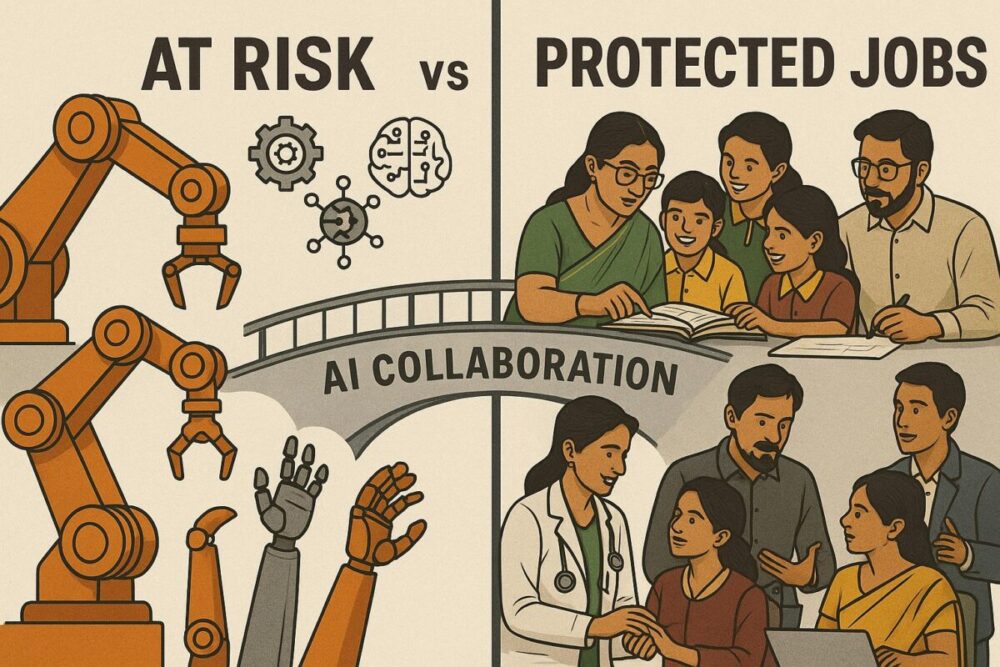AI Job Protection India: The artificial intelligence revolution has created unprecedented uncertainty about job security across India’s diverse economy, making AI job protection India strategies essential for every working professional. As automation and machine learning systems become more sophisticated, understanding which careers remain secure and how to future-proof your skills has become critical for long-term career success.
India’s position as a global technology hub means that AI adoption is accelerating faster than in many other countries, creating both opportunities and challenges for the workforce. While AI threatens certain traditional roles, it simultaneously creates new categories of employment that require human expertise, creativity, and emotional intelligence.
The key to successful AI job protection India lies in understanding which skills remain uniquely human, how to complement AI technologies rather than compete with them, and what career pivots can provide security in an increasingly automated economy.
AI Job Protection India: Understanding AI’s Impact on Indian Job Markets
AI Job Protection India: India’s diverse economy experiences AI disruption differently across various sectors. Information technology, manufacturing, and customer service face significant automation pressure, while healthcare, education, and creative industries show more resilience to AI replacement.
AI and automation: The IT sector, which employs millions of Indians, is undergoing fundamental transformation as AI automates routine coding, testing, and maintenance tasks. However, this same sector creates new opportunities for AI specialists, system architects, and professionals who can bridge business needs with AI capabilities.
Manufacturing automation affects millions of factory workers across India, but creates demand for technicians who can maintain AI-powered systems, quality control specialists who work alongside automated systems, and engineers who design human-AI collaborative processes.
Customer service automation through chatbots and AI assistants impacts call center employment, but generates opportunities for specialists who train AI systems, handle complex customer issues, and manage AI-human handoffs in customer experience workflows.
Sectors Most Resilient to AI Displacement
Healthcare professionals, particularly those involved in patient care, diagnosis requiring human judgment, and complex treatment planning, find strong AI job protection India opportunities. While AI assists with medical imaging and data analysis, human expertise remains essential for patient interaction and complex decision-making.
Education sector professionals who focus on personalized learning, emotional support, and creative curriculum development benefit from AI tools while maintaining job security. Teachers who adapt to use AI as teaching assistants rather than viewing it as competition often enhance their effectiveness and career prospects.
Creative industries including content creation, design, and strategic marketing find that AI enhances rather than replaces human creativity. Professionals who learn to collaborate with AI tools often produce higher quality work more efficiently than those working purely manually.
Legal professionals specializing in complex litigation, client counseling, and strategic legal planning maintain strong job security while benefiting from AI research and document analysis tools that enhance their productivity and accuracy.
Essential Skills for AI Job Protection India
Human-Centric Capabilities
Emotional intelligence has become one of the most valuable assets for AI job protection India, as machines cannot replicate genuine human empathy, cultural understanding, and interpersonal connection. Professionals who excel at reading emotional cues, managing team dynamics, and building trust find their skills increasingly valuable.
Creative problem-solving abilities that combine analytical thinking with innovative approaches remain uniquely human. While AI can process vast amounts of data and identify patterns, humans excel at connecting disparate concepts, challenging assumptions, and developing novel solutions to complex problems.
Communication skills that involve persuasion, negotiation, and cultural sensitivity become more valuable as AI handles routine communication tasks. Professionals who can explain complex concepts, influence stakeholder decisions, and navigate sensitive interpersonal situations maintain strong career security.
Leadership and management capabilities that involve inspiring teams, making strategic decisions under uncertainty, and adapting to changing circumstances provide excellent AI job protection India opportunities. These skills become more important as organizations navigate AI transformation while maintaining human-centered cultures.
Technical Adaptation Strategies
AI Job Protection India: AI collaboration skills enable professionals to work effectively alongside automated systems, using AI tools to enhance productivity while maintaining human oversight and decision-making authority. Learning to prompt AI systems effectively and interpret their outputs becomes a valuable meta-skill.
Data literacy helps professionals understand AI system outputs, identify potential biases or errors, and make informed decisions based on AI-generated insights. This capability becomes essential across industries as AI systems generate increasing amounts of analytical output.
Continuous learning mindsets enable professionals to adapt as AI capabilities evolve and new human-AI collaboration models emerge. The most successful professionals treat AI advancement as an opportunity to enhance their capabilities rather than a threat to their employment.
System thinking abilities help professionals understand how AI fits into broader organizational processes and identify opportunities for human-AI collaboration that create value beyond what either could achieve independently.
Industry-Specific Protection Strategies

Information Technology Sector
Software developers can achieve AI job protection India by specializing in areas requiring human creativity, such as user experience design, complex system architecture, and business process optimization. Focus on roles that involve client interaction, strategic planning, and innovative problem-solving.
Quality assurance professionals who understand both automated testing capabilities and complex scenario planning find strong job security. Specializing in edge case identification, user experience testing, and AI system validation provides protection against automation.
Project managers who excel at stakeholder communication, risk management, and team coordination remain essential even as AI automates technical tasks. These roles require human judgment, emotional intelligence, and adaptability that AI cannot replicate.
Technical consultants who can bridge business needs with AI capabilities find excellent career opportunities. Understanding both technical possibilities and business constraints enables valuable advisory roles that require human insight and relationship building.
Healthcare and Life Sciences
Medical professionals can enhance AI job protection India by developing expertise in AI-assisted diagnosis while maintaining focus on patient care, complex case management, and treatment planning requiring human judgment and empathy.
Nursing professionals who specialize in patient advocacy, emotional support, and care coordination find their roles enhanced rather than threatened by AI systems that handle routine monitoring and documentation tasks.
Healthcare administrators who understand both AI capabilities and healthcare regulations find strong career opportunities managing AI implementation while ensuring compliance and quality outcomes.
Mental health professionals benefit significantly from AI tools for data analysis and pattern recognition while maintaining exclusive domain over therapeutic relationships and complex emotional intervention strategies.
Education and Training
Educators who focus on personalized learning, student mentorship, and creative curriculum development find AI enhances their effectiveness while preserving job security. AI can handle routine tasks like grading and scheduling, freeing teachers for higher-value human interactions.
Corporate trainers specializing in soft skills, leadership development, and change management find strong AI job protection India opportunities as organizations need human expertise to navigate AI transformation while maintaining effective teams.
Educational technology specialists who understand both AI capabilities and learning psychology can design effective human-AI collaborative educational experiences that leverage technology while preserving essential human elements.
Curriculum developers who can integrate AI tools into learning experiences while maintaining focus on critical thinking, creativity, and emotional development create valuable educational innovations.
Future-Proofing Your Career
Skill Development Priorities
Developing meta-skills that enable adaptation to changing technology environments provides the strongest AI job protection India foundation. Focus on learning how to learn, problem-solving frameworks, and change management capabilities that remain valuable regardless of specific technological advances.
Cross-functional expertise that combines domain knowledge with understanding of AI capabilities creates valuable niche specializations. Professionals who understand both their industry and AI possibilities can identify optimal human-AI collaboration opportunities.
Ethical reasoning and bias detection skills become increasingly important as AI systems influence more organizational decisions. Professionals who can identify ethical concerns and ensure responsible AI implementation find strong career security.
Cultural competency and global perspective become more valuable as AI enables remote collaboration across geographic and cultural boundaries. Understanding diverse perspectives and communication styles enhances career resilience in globalized markets.
Strategic Career Planning
AI Job Protection India: Building diverse skill portfolios that combine technical capabilities with uniquely human strengths provides multiple career pathways as industries evolve. Avoid over-specialization in areas likely to be automated while developing complementary skills that enhance AI systems.
Professional networking focused on human relationships rather than just technical knowledge creates career opportunities that AI cannot generate. Investing in genuine professional relationships provides access to opportunities and collaboration that transcend technological disruption.
Continuous market analysis to understand how AI impacts your specific industry enables proactive career adjustments before disruption occurs. Staying informed about AI developments and their implications helps identify emerging opportunities and threats.
The path to successful AI job protection India requires embracing AI as a collaborative tool while developing uniquely human capabilities that complement rather than compete with artificial intelligence. Success comes from understanding that the future workplace will be defined by human-AI collaboration rather than human replacement.

